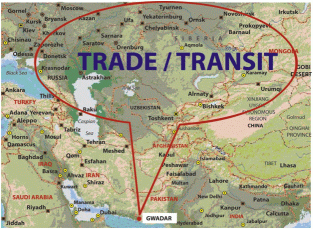Pakistan – Russia Geopolitics by Nadir Mir…
Pakistan – Russia Geopolitics: by Nadir Mir
Author of the book “Gwadar on the Global Chessboard”
His Blog: Pakistan and Geopolitics
The author is a retired Brigadier of the Pakistan Army.
Pakistan – Russian amity is natural. It was forsaken at the altar of the Cold War. America’s quest for Soviet Union’s containment and Pakistan’ need of support against bellicose India resulted in the US – Pakistan alliance. Today the world has changed geopolitically, in Pakistan’s favour. The time has come for Pakistan – Russian friendship to be solidified. Pakistan’s COAS visit to Russia was timely and historic. Even earlier Pakistan Air Chief had already visited Russia.
Pakistan’s Geopolitics has often been misunderstood. The time to remedy that has also arrived. In my book ‘Gwadar on the Global Chessboard’ I have already projected Pakistan’s identity. Pakistan is a multiregional state and not only South Asian. South Asia is Pakistan’s Eastern linkage that is Punjab – Sindh Provinces. Khyber Pakhtoonkhwa is the link to Afghanistan and Central Asia while Kashmir, Northern Areas to China and Central Asia. Baluchistan is linked to Iran, Turkey, Gulf – Saudi Peninsula and Western Asian affinity.
Pakistan’s location is globally pivotal. It is located at the cross roads of the historical empires. It is Geo economically a bridge state and Geo strategically the interposing state between multi regions. A friendly Pakistan is a blessing and a hostile Pakistan is a disaster for any world power with interests in these regions.
To ignore Pakistan’s Geo strategic location, its youth bulge demography soaring towards 200 millions and its formidable military – nuclear forces is an act of imprudence. The Americans were the first, Chinese the second and now Russians also appreciate Pakistan’s Geopolitical merits. The Indian propaganda of ‘Shining India’ is fast eroding. The most critical Geopolitical State Actor in these regions is called Pakistan.
Afghanistan
US – NATO forces or bulk will be withdrawing from Afghanistan. Stability in Afghanistan needs the principal player Pakistan on board. Left over US forces besides interests will be dependent on Russian and Pakistan’s logistic supply routes. Pakistani – Russian coordination will help bring peace in Afghanistan. The Chinese are increasing their investments and stakes in Afghanistan. Instability needs to be reduced in Afghanistan and militancy blocked from spreading into Central Asia. Geo economic and Geo strategic interests of Russia and Pakistan coincide. Energy should travel southwards towards Pakistan and drugs stopped from travelling northwards into Russia. Secondly left over US – NATO military presence in Afghanistan should suit neither Moscow, nor Beijing or Islamabad and certainly not Tehran for that matter. Delhi which prays for US military longevity in Kabul is at odds with Pakistan, Russia, China and Iran on that score. Simply because even a small foreign military presence in Kabul will keep Afghanistan on the path of war rather than peace.
Gwadar and Energy – Trade, Transit Grid
The Chinese are arriving in Gwadar. The Russians are also keen to join. For centuries Russians coveted these warm waters. From my book ‘Gwadar on the Global Chessboard’ I quote,: “the quest for warm waters is a coveted aim since Czarist times. . . . . . . . . . . . . . . . . . . . . . . . . Russia with its firm anchor in Gwadar can support the Asian hinter land development.” This can join Southern Russia to the Arabian Sea.
From the Baltic Sea near Saint Petersburg, to Archangel in the North, Vladivostok in the East to the hemmed in Black Sea ports, the Russians need warm waters. Gwadar Deep Sea warm water port could fulfill an old Russian dream. In time Russian Gazprom will join the energy grid of Asia at Pakistan’s Gwadar. Russia through Central Asian states can also use Gwadar for trade and transit. Gwadar will bind Pakistan, China, Russia and Central Asian states. Geo economic interests of these state actors increasingly coincide with the Geo strategic interests.
Gwadar and Central Asia / Russia / China

(Map from the book by author, ‘Gwadar on the Global Chessboard’)
A Russian – Pakistan friendship pact could prove to the world that both states stand for peace in the world. They seek prosperity for their people, share common values of equality for all nations, freedom for the people, from the Slavic Heartland to Indus River. Both abhor violence; can jointly fight terrorism, separatism, drugs and other evils.
Russia under President Putin’s leadership is striving for Global Peace. Pakistan has suffered for eleven years due to the war in Afghanistan. Now the people of Pakistan ardently seek an end to this long and pointless war. Russia and Pakistan can jointly facilitate an American Exit Strategy from Afghanistan. In this respect an understanding among Russia, Pakistan, USA and China can help achieve peace in Afghanistan. This will radiate peaceful waves from the epi center of Afghanistan. Russia and Pakistan can also help create consensus in the entire Central Asian and West Asian regions for peace and Geo economic bonding.
Pakistan – Russian Geopolitical understanding is not directed against anyone. Pakistan can maintain its old friendship with USA and strategic partnership with China while Russia has its traditional relations with India. Still new friendship between Pakistan and Russia will not only benefit both but also contribute to peace and prosperity in the world.
Geopolitics of Peace: by Nadir Mir. Author of the book “Gwadar on the Global Chessboard” Blog: Pakistan and Geopolitics wwwpakistangeopolitics.blogspot.com/ The author is a retired Brigadier General of the Pakistan Army.
Windows to Russia!
The views of the above author are not strictly only the views of Windows to Russia. They are an independent view from an outside source that brings a better light on the world in general and Windows to Russia is very pleased to have Nadir Mir’s thoughts on its pages today and in the future. So take a look at his site and read a few articles. – Kyle Keeton
Related articles
- Baluchistan and Pakistan Army by Brigadier Nadir Mir… (windowstorussia.com)
- National interest and Pakistan Army by Nadir Mir… (windowstorussia.com)
- The Pakistan-Russia Relationship: Geopolitical Shift in South and Central Asia? by Dr Rashid Ahmad Khan (windowstorussia.com)
- The enemy and Pakistan Army by: Nadir Mir… (windowstorussia.com)
- American influence in the Middle East slipping by Nadir Mir… (windowstorussia.com)
